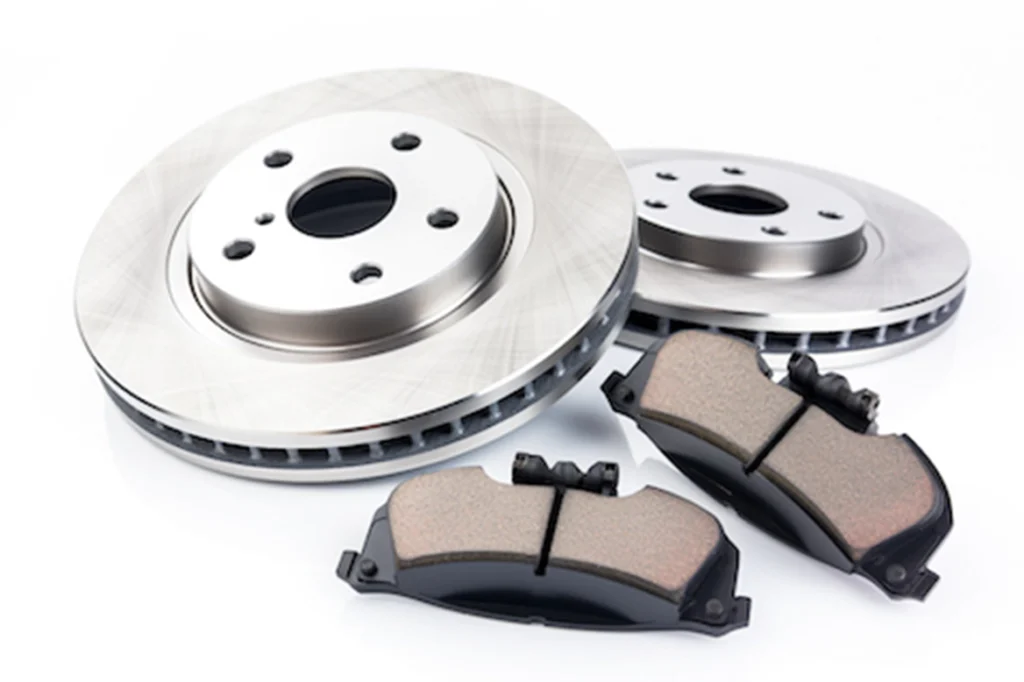How Often Do You Change Brake Pads and Rotors

What kind of driver are you?
Do you fly down the road and slam on the brakes when coming to a red light? Do you travel downhill a lot? Could your backseat pass as a storage unit?
Your answers to these questions may help you determine how often to change brake pads and rotors. The truth is, there is no set mileage when brake pads or rotors will require replacement. Your driving habits, road conditions, and the type of brake pads your vehicle currently is equipped with determines the life of your brake pads and rotors and how often replacement is necessary.
Understanding the Braking Process
When you press down on the brake pedal, the pressure is amplified by the aid of a hydraulic fluid, known as brake fluid, to create friction at the wheels making the vehicle stop. Depending on your vehicle’s set up, when the brake pedal is engaged either a lever system, vacuum, hydraulic or electronic mechanism, pushes the fluid to each wheel. The movement of the pressure drives the brake fluid into the brake lines at each wheel. Many vehicles equipped with anti-lock braking systems include a valve that regulates this pressure created to help prevent the brakes from locking up and forcing the car to spin out. Once the pressure is created the brake calipers, or wheel cylinders, force the brake pads or shoes toward the rotor or drum, increasing pressure and friction that ultimately slow and stop the vehicle.
Lifespan of Brake Pads and Rotors
The longevity of brakes can depend on several variables. Heavy city traffic with frequent stop and go conditions, worn out suspension system components, vehicle weight and cargo load, steep inclines, brake fluid condition, driving habits, and the brake pad’s friction material quality impact the duration of the brake system’s life.
So, how often should you change your brake pads? Depending on these variables, most brake pads last anywhere between 30,000 and 70,000 miles.
Brake rotors have the potential to last beyond the life of many brake pads, depending on the driver and brake maintenance. Many rotors are able to be machined, or resurfaced, depending on wear which may extend their life. As long as brake rotors have no signs of warping or are otherwise cracked, a technician can resurface the top layer down to a smooth and flat surface within the manufacturer’s specifications, giving it a like-new life. Depending on the thickness of the material and how much material has to be removed, a rotor can be resurfaced more than once.
A technician will be able to remove your rotors and determine whether they can be machined and reused or if its wise to replace them all together. Rotors should be machined whenever brake services are performed on your vehicle, including when replacing brake pads. This ensures a smoother and more successful braking experience that helps extend the life of the new brake pads. There are drawbacks to resurfacing rotors, however.
Machining rotors is a temporary resolution and at some point the rotors will require replacement. When rotors are machined, they lose some material that reduces the dissipation of heat, which can result in minor losses of braking power and lead to brake fade.
Not all vehicles are equipped with rotors that can be machined. Many performance vehicles utilize a softer rotor that may have slots or grooves that do not allow for resurfacing.
The Cost of Replacing Brakes
You may be asking how much does it cost to replace brake pads? However, brake repair costs vary depending what is needed to repair them properly. Vehicle needs vary based on make and model and the condition of other brake components. An expert in brakes will be able to inspect the system and determine each vehicle’s individual needs and provide an estimate to properly repair the braking system.
Tips on Extending the Life of Your Brakes
Having reliable brakes is imperative when driving. Having to replace brakes more frequently than usual can get costly. Here are the Do’s and Don’ts in extending the life of your brakes:
Do:
- Follow maintenance guidelines – Replace brake pads when recommended. Badly worn brake pads cause rotors to warp from overheating.
- Drive the speed limit – Driving fast requires fast stops. Fast braking creates friction and heat and wearing down brake pads.
Don’t:
- Over load your car – The heavier the load a vehicle must carry, the harder brakes must work in order to stop the vehicle. Brakes that are forced to work harder do not last long.
- Ride the brakes downhill – Downshift to a lower gear to allow the transmission and engine slow the car.